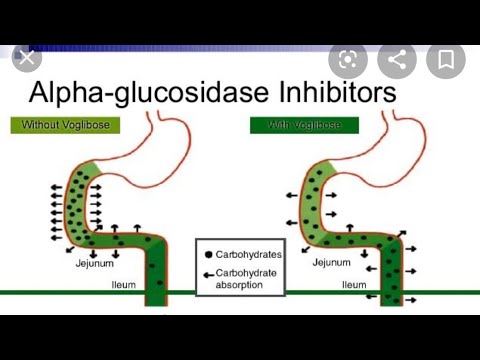Alpha glucosidase inhibitors
Federal government websites often end in. Before sharing sensitive information, make sure you're on a federal government site.
Cardiovascular Diabetology volume 18 , Article number: Cite this article. Metrics details. Alpha-glucosidase inhibitors AGIs have been shown to reduce incident type 2 diabetes but their impact on cardiovascular CV disease remains controversial. Of ten trials identified, three met our inclusion criteria for incident type 2 diabetes and four were eligible for CV outcomes. There was little to no heterogeneity between studies, with I 2 values of 0. Alpha-glucosidase inhibitors AGIs such as acarbose, miglitol and voglibose are oral drugs used in the management of diabetes, primarily to reduce post-prandial glucose concentrations. Their use in individuals with impaired glucose tolerance IGT has been shown to delay progression to diabetes, but their effects on cardiovascular CV outcomes remain uncertain [ 1 ].
Alpha glucosidase inhibitors
The alpha-glucosidase inhibitors acarbose, miglitol, voglibose have been studied extensively in Europe and Japan; two of them, acarbose and miglitol, are available in the United States. Taken orally, they inhibit the upper gastrointestinal enzymes alpha-glucosidases that convert complex polysaccharide carbohydrates into monosaccharides in a dose-dependent fashion. These drugs therefore slow the absorption of dietary carbohydrate; the slower rise in postprandial blood glucose concentrations is potentially beneficial in both type 1 and type 2 diabetes. In addition, the transfer of polysaccharides to the more distal small intestine increases the secretion of glucagon-like peptide 1 GLP-1 and several other gut hormones [ 1 ]. In older patients with type 2 diabetes, acarbose may also increase insulin sensitivity [ 2 ], although this may have been a nonspecific effect associated with improved glycemia. Alpha-glucosidase inhibitors do not cause hypoglycemia when used as monotherapy or with other agents that do not cause hypoglycemia. Acarbose and voglibose have also been evaluated for the prevention of type 2 diabetes. See "Prevention of type 2 diabetes mellitus", section on 'Drugs not recommended for prevention'. Glycemic efficacy — Several trials have demonstrated the glycemic efficacy of alpha-glucosidase inhibitors in patients with type 2 diabetes [ ]. Why UpToDate? Learn how UpToDate can help you. Select the option that best describes you. View Topic. Font Size Small Normal Large.
Alpha Glucosidase Inhibitors. Diabetic Medicine.
Alpha-glucosidase inhibitors AGIs are oral anti-diabetic drugs used for diabetes mellitus type 2 that work by preventing the digestion of carbohydrates such as starch and table sugar. Carbohydrates are normally converted into simple sugars monosaccharides by alpha-glucosidase enzymes present on cells lining the intestine, enabling monosaccharides to be absorbed through the intestine. Hence, alpha-glucosidase inhibitors reduce the impact of dietary carbohydrates on blood sugar. Even though the drugs have a similar mechanism of action, there are subtle differences between acarbose and miglitol. Acarbose is an oligosaccharide , whereas miglitol resembles a monosaccharide. Miglitol is fairly well absorbed by the body, as opposed to acarbose. Moreover, acarbose inhibits pancreatic alpha-amylase in addition to alpha-glucosidase, and is degraded by gut bacterial maltogenic alpha-amylase and cyclomaltodextrinase.
There's more to see -- the rest of this topic is available only to subscribers. Renew my subscription. Not now - I'd like more time to decide. Tags Type your tag names separated by a space and hit enter. Search Johns Hopkins Diabetes Guide. Alpha Glucosidase Inhibitors. Alona Crowder, Pharm. Citation Crowder, Alona, et al.
Alpha glucosidase inhibitors
The alpha-glucosidase inhibitors acarbose, miglitol, voglibose have been studied extensively in Europe and Japan; two of them, acarbose and miglitol, are available in the United States. Taken orally, they inhibit the upper gastrointestinal enzymes alpha-glucosidases that convert complex polysaccharide carbohydrates into monosaccharides in a dose-dependent fashion. These drugs therefore slow the absorption of dietary carbohydrate; the slower rise in postprandial blood glucose concentrations is potentially beneficial in both type 1 and type 2 diabetes.
Carx drift racing 2 mod apk unlimited money
Treating postprandial hyperglycemia does not appear to delay progression of early type 2 diabetes: the Early Diabetes Intervention Program. Ruth L. Miglitol is fairly well absorbed by the body, as opposed to acarbose. Sorry, a shareable link is not currently available for this article. PMC Controlling postprandial hyperglycemia is essential as it correlates with the development of microvascular complications and increases the risk for the development of cardiovascular diseases. Applied and Environmental Microbiology. Alpha glucosidase inhibitor. The effectiveness of AGIs is affected by the number of complex carbohydrates in the diet. They do not have correlations with any serious adverse effects. J Pak Med Assoc. Derosa G, Maffioli P. All authors reviewed the manuscript. An earlier meta-analysis of randomised controlled trials of alpha-glucosidase inhibitors suggested that they may prevent the progression if carotid intima thickness in patients with IGT or type 2 diabetes, [ 14 ] but our CV meta-analysis suggests this does not translate into fewer CV events.
Federal government websites often end in. Before sharing sensitive information, make sure you're on a federal government site. The site is secure.
Even though the drugs have a similar mechanism of action, there are subtle differences between acarbose and miglitol. Glycemic efficacy — Several trials have demonstrated the glycemic efficacy of alpha-glucosidase inhibitors in patients with type 2 diabetes [ ]. The site is secure. Formulary drug information for this topic. Metrics details. Download references. The use of acarbose but not other AGIs has potential links with hepatitis in some instances. Recent studies have demonstrated cardio protection with sodium-glucose cotransporter-2 inhibitors and glucagon-like peptide-1 receptor agonists [ 18 , 19 ] probably via non-glycaemic mechanisms. Holman RR. The general recommendation is to always start with a lower dose, both to reduce the frequency of adverse effects and to achieve the desired dose for optimal glycemic control. View author publications. They may also be used in patients with impaired glucose tolerance and delay the occurrence of type 2 diabetes mellitus in these patients.


In my opinion here someone has gone in cycles